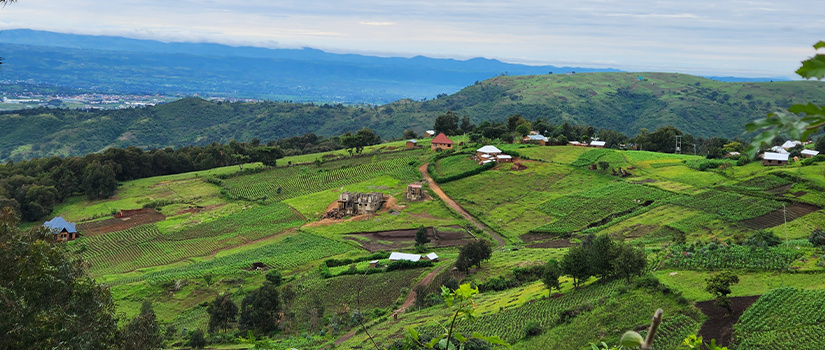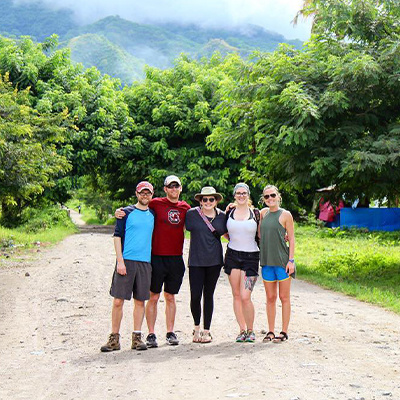In 2017, Brandon Bookstaver, ’04, was asked if he had ever considered traveling internationally to help health care providers learn more about antibiotics and infectious diseases. Six years later, Bookstaver completed his third trip to Mbeya Zonal Referral Hospital in the southern highlands of Tanzania.
“We introduced the concept of being stewards of antibiotics to help them form an antibiotic management team,” says Bookstaver.
These medical trips offer an opportunity for pharmacy and medical students, residents and fellows to learn more about providing care to underserved populations and the health care issues facing patients in remote locales.
“We use the buzzwords of cultural competency and social determinants of health, but you cannot know it until you go and live it,” Bookstaver says. “Our team is going out into the community around Mbeya, talking to the pharmacists there and learning the culture.”
A typical day for the team includes rounding with patients, conducting research and holding seminars for hospital staff.
Much of the teamwork focuses on conducting research to find solutions to providing a higher level of care to their patients.
“They don’t have the capability or the resources to collect the data to help them improve their health care delivery, so we help them with that,” he says. “And the information we gather is specific to the infectious diseases that are prevalent in these areas.”
One study centered on the timeliness of providing antibiotics to patients diagnosed with sepsis.
“When you find out that it takes 23 hours to get the first dose of an antibiotic to a patient, that’s very concerning,” he says. “We helped them develop guidelines based on the ‘bugs’ that they have, which are very different than what we have. The resistance profiles are different, and their laboratory capabilities are extremely different.”
In the search to collect useful data, the lack of medical records proved to be a barrier.
“They do have electronic medical records, but not everything is included in that,” Bookstaver notes. “For example, medical charts would be dumped in a barrel and burned after a patient was discharged, so we asked to hold on to those a bit longer until we could review them for our research.”
Sarah Elizabeth Davis, ’19, is an emergency medicine pharmacist who accompanied Bookstaver to Mbeya in 2019. She had previously completed a rotation in Africa and wanted the chance to gain more international health care experience.
“I learned that Africa has limited resources for health care, and I developed an interest in learning more about how medicine is practiced in remote locations,” she says. “If a student has the opportunity and the means to go, I highly recommend it, because it is an incredibly humbling experience.”
Stephanie Shealy May, ‘18, is an infectious diseases and antimicrobial stewardship telehealth pharmacist with Intermountain Health in Salt Lake City. She traveled to Mbeya in February 2020 as one of her elective rotations while a postgraduate second year resident in infectious diseases at Prisma Health Richland.
“Having a pharmacist on the team was not something that they had access to all the time,” she says. “What I appreciated most was that they were excited and eager to share things about their culture and how things are done at their hospital that were different from how things are done at ours.”
May learned to be more understanding of how health care entities function with fewer resources and how she can better support them.
“One of the phrases we used the most was ‘Asante sana,’ which means ‘Thank you very much,’” she says. “There were lots of opportunities to teach and collaborate with them. Everyone was so grateful, excited to have us and eager to learn and share experiences.”
Working as a telehealth infectious disease pharmacist, May serves many critical health and rural hospitals in Utah and the Intermountain West region.
“Some of these hospitals are quite remote and do not have the resources you might find in an academic medical center or referral hospital,” she says. “In Tanzania, I learned how to tailor my approach to a limited-resource and culturally diverse setting, a skill I now use every day in my current role.”
Team members get to enjoy regional excursions during their free time.
“We have been to soccer matches, visited Zanzibar on the coast, been to Malawi, gone on safaris,” Bookstaver says. “All of these things add to their experiences and help them understand the culture better.”
Bookstaver encourages students and residents to consider learning opportunities such as international rotations.
“I am a big proponent of saying ‘yes.’ It is an opportunity to be a part of something that has an impact on others,” he says. “It is a big win for everyone involved – our students, our residents, the hospital in Mbeya and their staff and their patients. We have come a long way, but there is much more to do.”
Topics: Alumni Programs, Pharm.D. Program, Experiential Education

